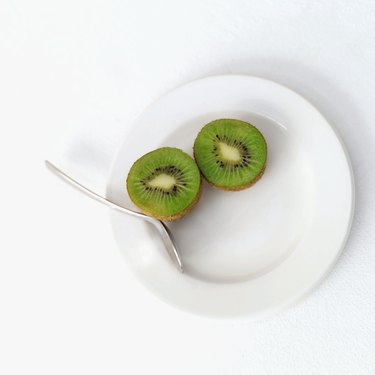
Kiwifruits, or kiwi, is an edible berry about the size of a chicken egg. It features a fuzzy peel that surrounds a green fruit with black seeds and a creamy white center. Kiwis taste slightly sweet and tangy with a creamy texture. It is available year-round in most grocery stores and is often eaten alone or as part of a salad, on fruit tarts or in smoothies. In addition to counting as 1/2 cup, or one serving, of fruit, according to the U.S. Department of Agriculture Food Guide Pyramid, kiwis offer a wealth of nutrients.
Fiber
Video of the Day
One cup of sliced kiwifruit provides 5g of fiber. The Institute of Medicine recommends most adult women consume at least 25g of fiber daily and men, 38g. Fiber can help fill you up, keep your digestive system running well and may help lower cholesterol.
Video of the Day
Vitamins
In 1 cup of kiwi, you get over 270 percent of the recommended dietary allowance for vitamin C. Vitamin C acts as an antioxidant, scavenging free radicals in your body to help prevent disease. It is also essential to the formation and repair of tissue, particularly cartilage, blood vessels, tendons and skin. Kiwi is also a source of vitamin K, with 1 cup offering 89 percent of the RDA. Vitamin K helps with blood clotting and absorption of vitamin D. Kiwi also provides 13 percent of the RDA for vitamin E and 11 percent for folate in a 1-cup serving.
Potassium
Potassium is a mineral that helps keep your body's fluids and other minerals in balance. Too little potassium may lead to weakness, stroke and irregular heartbeat. One cup of kiwi contains 552mg of potassium, more than the 467mg found in a small banana. A potassium-rich diet helps to control blood pressure.
Low Calorie
Choosing kiwifruit as a snack in lieu of higher calorie fare can help you control your weight. One medium-sized fruit has just 46 calories, and a full cup of kiwi slices contains 108 calories, about the same amount as a medium banana. Use kiwi to replace half of your morning cereal to save calories; add it to cottage cheese for a high-protein, low-calorie snack; or blend it into a smoothie with mint leaves and strawberries.
Related Reading
Kiwis are natives of the China's Yangzte River Valley, but today are grown commercially worldwide. The fuzzy brown-skinned fruit with the tasty green center is loaded with nutritional benefits that rival those of many other fruits. Whether you eat them or apply the flesh to your skin, kiwis contain vitamins and other nutrients that contribute to healthy, glowing skin. When choosing a topical cream or gel that contains kiwi or kiwi extract, keep in mind that research into topical applications of kiwi is ongoing.
Firm Skin
Kiwis contain large amounts of vitamin C, which helps your body produce collagen, a connective tissue protein that helps to firm your skin. Production of collagen decreases with aging, causing skin to lose elasticity. Collagen-stimulating ingredients, like kiwi extract, may be added to skin care products to slow the appearance of aging.
Soft Skin
Vitamin C not only firms skin, it repairs it. Kiwis have more vitamin C than a comparable amount of oranges. Vitamin C helps cuts and abrasions heal and it also works to prevent rough, dry skin. In addition to skin care products that contain kiwi extract, get an internal vitamin C boost with a fresh salad of kiwi, strawberries and citrus slices to help protect skin from the inside out.
Smoother Skin
Kiwis are a good source of vitamin E. The University of Maryland Medical Center says that topical vitamin E may decrease facial lines and the depth of wrinkles. Studies of vitamin E as an external application are inconclusive but ongoing. Vitamin E has been shown to reduce UV-induced skin cancer in animal testing. Remember that cosmetics are not as strictly regulated by the U.S. Food and Drug Administration as products that are classified as drugs. Sunblock does offer you protection from harmful ultraviolet, or UV, rays. Wrinkle cream may or may not erase those frown lines.
Younger Skin
You can't turn the clock back but you may be able to slow it down. Kiwis are a major source of antioxidants that can delay the effects of aging throughout the body. Antioxidants neutralize the free radicals that can damage healthy cells and hasten the process of degeneration, including changes in skin thickness, elasticity and firmness. You should get your antioxidants from food sources, like kiwis that have a complex mix of vitamins C, E, lycopene and other substances that fight free radicals.